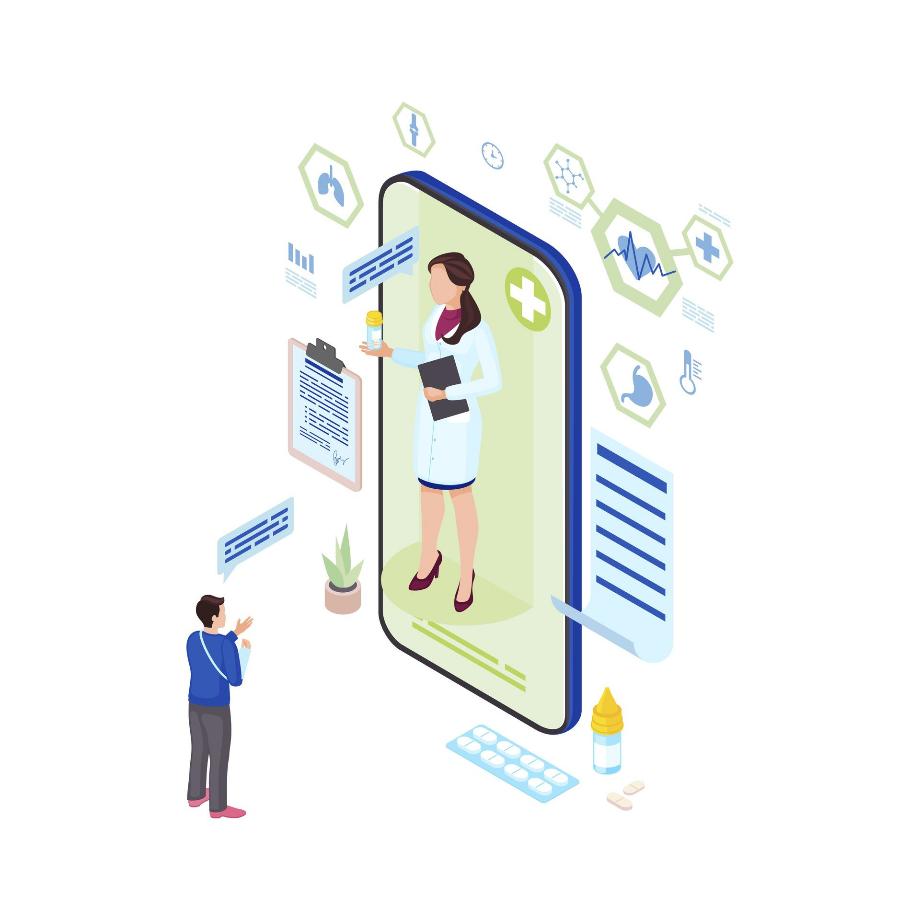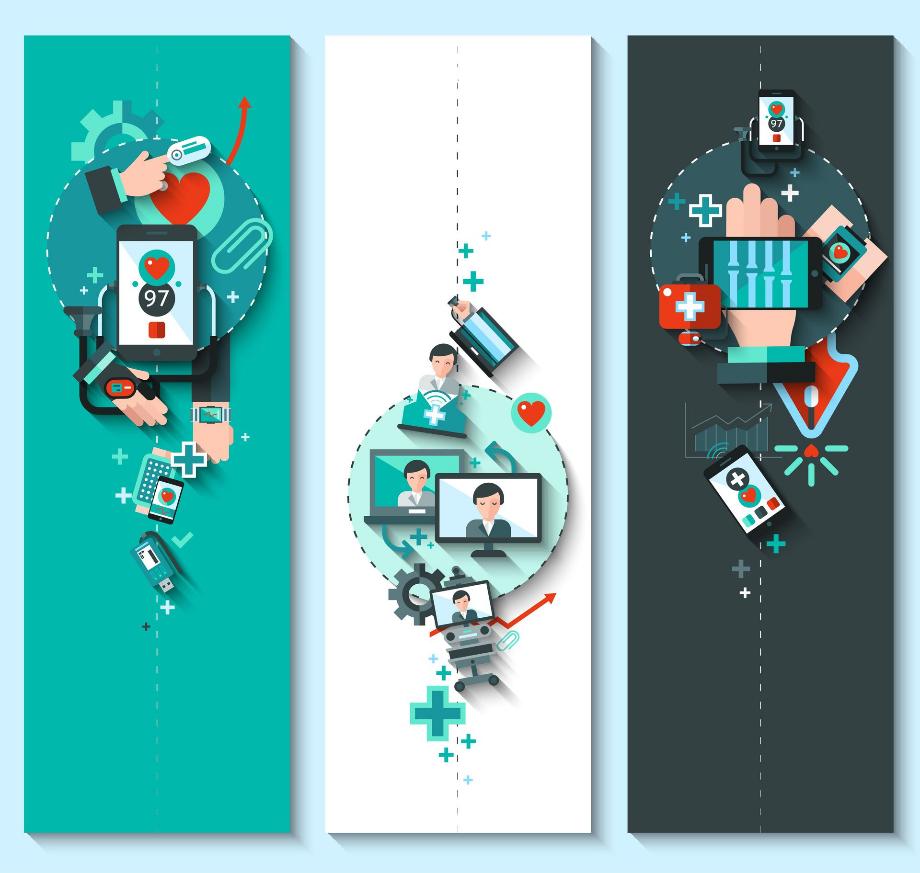Obwohl moderne Computer- und Medizintechnik schon lange in den Krankenhäusern und Praxen Deutschlands vorhanden sind, hat die Corona-Pandemie uns die unzureichende Digitalisierung in vielen Bereichen der Gesellschaft vor Augen geführt - so auch in unserem Gesundheitswesen. Ob Schwierigkeiten beim Erfassen von Erkrankten und Kontaktpersonen, beim Organisieren und Buchen eines Impftermins oder beim digitalen 3G-Nachweis.
In Sachen Digitalisierung ist das deutsche Gesundheitswesen im internationalen Vergleich weit hinten. Dabei stellt der demografische Wandel, der Fachkräftemangel sowie komplexe Anforderungen bezüglich Sicherheit und Wirtschaftlichkeit Krankenhäuser, Versorgungszentren, Krankenkassen und Praxen vor hohe Herausforderungen. Um diesen zu begegnen und gerecht zu werden, sind moderne IT-Lösungen unabdingbar.
Doch was genau bedeutet "Digitalisierung im Gesundheitswesen“ und welche Chancen bringt diese mit sich?
Im Zentrum dabei stehen medizinische Daten des Patienten, die mittels Informations- und Kommunikationstechnologien zwischen Ärzten und Patienten, aber auch zwischen den einzelnen Leistungserbringern, ausgetauscht werden. Dabei entstehen nicht nur neue Verwaltungs-, sondern auch neue Diagnostik- und Behandlungsmöglichkeiten. Zudem vereinfacht und beschleunigt die Digitalisierung die Kommunikation zwischen den einzelnen Akteuren im Gesundheitswesen. Digitale Lösungen haben also auch hier viele Gesichter: ob Robotik, Künstliche Intelligenz oder Big Data - hochmoderne Entwicklungen unseres digitalen Zeitalters finden in der Gesundheitswirtschaft Anwendungsmöglichkeiten.

Künstliche Intelligenz (KI) hat bereits in der Industrie unter anderem beim Automatisieren von Arbeitsabläufen und Optimieren von Prozessen ihren Nutzen gezeigt und Erfolge erzielt.
Im Gesundheitswesen können KI-Technologien eine Steigerung der Qualität und gleichzeitig eine Senkung der Kosten bewirken. Die KI lernt dabei von digitalen Gesundheitsdaten, wie Symptome der Patienten, kann Muster erkennen und so Ärzte bei der Diagnose unterstützen, indem erste Diagnosevorschläge unterbreitet werden. Dies trägt zu einer früheren Erkennung von Krankheiten und letztlich zu einer besseren Patientenversorgung bei. Die Anwendung der KI kann somit auch im Bereich Gesundheit zu einer Schlüsseltechnologie der Zukunft werden. Laut einer Studie der Wirtschaftsprüfungsgesellschaft PwC sind 64 Prozent der deutschen Führungskräfte davon überzeugt, dass KI die Medizin in den kommenden zehn Jahren revolutionieren wird. Konkrete Schritte eingeleitet haben allerdings laut der Studie erst 30 Prozent. Grund dafür sind regulatorische Fragestellungen, etwa bezüglich des Datenschutzes, welche es zu klären gilt.
Besonders zukunftsweisend ist die Möglichkeit der Schaffung eines sogenannten digitalen Zwillings. Auf Basis der relevanten Patientendaten können Ärzte eine Computersimulation des Patienten anfertigen und genauere Diagnosen und Vorhersagen möglicher Behandlungswege erstellen. Mit diesen digitalen Doppelgängern als Abbild der Patienten entstehen große Hoffnungen in der Medizin, die personalisierte und individuelle Therapie zu revolutionieren. Davon überzeugt, dass dieser digitale Zwilling die Forschung vorantreiben wird, sind 74 Prozent der Deutschen und sogar 83 Prozent würden ein Testmodell von sich anfertigen lassen. Jedoch zeigen sich auch hier Bedenken zum Thema Datenschutz: 80 Prozent der Befragten gaben an, dass sie befürchten, dass Daten in die falschen Hände gelangen könnten.
Weitere Bestandteile der Digitalisierung im Gesundheitswesen sind Robotik, E-Health und Telemedizin. Meist als Assistenzsysteme genutzt, können robotergestützte Verfahren sowohl im Operationssaal als auch in der Pflege eingesetzt werden und unterstützen. Der Einsatz von Robotik im Gesundheitswesen ist in anderen Ländern schon lange keine Zukunftsmusik. Ob spezielle Pflegeroboter, welche Pflegefachkräfte bei einzelnen Tätigkeiten entlasten, sodass diese mehr Zeit für die Patienten selbst haben, intelligente Pflegewagen, welche den Pflegenden Utensilien bringen und somit Laufwege ersparen oder Roboter, welche Patientenakten aufbereiten - die Einsatzmöglichkeiten von Robotik sind vielfältig und können vor allem auch beim Problem des Fachkräftemangels unterstützen.
Auch die Telemedizin - Monitoring, Diagnostik und Therapie über räumliche Distanzen hinweg dank moderner Kommunikationslösungen - ist weiterer Bestandteil der Digitalisierung des Gesundheitswesens. Dabei ist es den Patienten in Deutschland laut einer Studie der Wirtschaftsprüfungsgesellschaft PwC wichtig, dass auch in Zeiten der Digitalisierung Ärzte als menschlicher Faktor und Ansprechpartner erhalten bleiben. Trotz großer Bedenken bezüglich der Datensicherheit wünschen sich 74 Prozent der Studienteilnehmer einen Ausbau von Beratungsangeboten im Internet. Ob in Form von Video-Sprechstunden oder Online-Chat - die Telemedizin scheint eine willkommene Ergänzung zur üblichen medizinischen Versorgung.
Neben dem Ausbau der Telemedizin, welche ein Teil von E-Health ist, ist auch die elektronische Patientenakte und das elektronische Rezept von zentraler Bedeutung für die Digitalisierung und einen modernen Versorgungsalltag. Mit der Einführung der elektronischen Patientenakte und des elektronischen Rezeptes sollen laut dem Bundesministerium für Gesundheit wichtige Weichen für die Verbesserung der Gesundheitsversorgung in Deutschland gestellt worden sein. Diese Formen von E-Health sollen Verwaltung und Organisation vereinheitlichen und so die Kommunikation verschiedener Akteure erleichtern.

Betrachtet man die Chancen, welche hinter den Einsatz- und Anwendungsmöglichkeiten modernster IT-Techniken und Lösungen stehen, nun gebündelt, wird schnell deutlich: sie sind enorm.
Ob Verwaltungs- und Organisationsunterstützung, Kommunikationserleichterung und schnellere, genauere Erkennung und Überwachung von Krankheiten und Therapieverläufen - eine bessere, flächendeckende und bezahlbare medizinische Versorgung kann durch die notwendige Digitalisierung des Gesundheitswesens erreicht werden.
Es gibt viel aufzuholen, sei es der Ausbau organisationsübergreifender Vernetzung, die Optimierung der (individuellen) Patientenversorgung, Steigerung der Kosteneffizienz und vor allem dabei die Schaffung und Beachtung von datenschutzrechtlichen und regulatorischen Regelungen und Anforderungen.
Diesen und weiteren Herausforderungen wie Fachkräftemangel, demografischer Wandel und Urbanisierung kann durch einen Einsatz von Technik und IT- Lösungen erleichtert begegnet werden.
Quellen: www.firmen.handelsblatt.com, www.bundesgesundheitsministerium.de, www.gesundheit-digitalisieren.de, www.pwc.de
Medizin 2.0